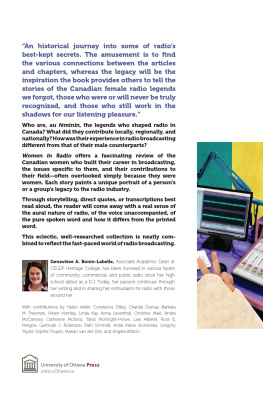Table of Contents
Landmarks
Page List

WOMEN IN RADIO

The University of Ottawa Press (UOP) is proud to be the oldest of the francophone university presses in Canada as well as the oldest bilingual university publisher in North America. Since 1936, UOP has been enriching intellectual and cultural discourse by producing peer-reviewed and award-winning books in the humanities and social sciences, in French and in English.
www.press.uOttawa.ca
Library and Archives Canada Cataloguing in Publication
Title: Women in radio : unfiltered voices from Canada / edited by Genevive A. Bonin-Labelle.
Names: Bonin-Labelle, Genevive A., 1979- editor.
Series: Canadian studies (Ottawa, Ontario)
Description: Series statement: Canadian studies | Includes bibliographical references.
Identifiers: Canadiana (print) 20200228110 | Canadiana (ebook) 20200235176 | ISBN 9780776629056 (softcover) | ISBN 9780776629094 (hardcover) | ISBN 9780776629063 (PDF) | ISBN 9780776629070 (EPUB) | ISBN 9780776629087 (Kindle)
Subjects: LCSH: Women in radio broadcastingCanadaHistory. | LCSH: Radio broadcastingCanadaHistory.
Classification: LCC HE8699.C2 W66 2020 | DDC 384.54082/0971dc23
Legal Deposit: Third Quarter 2020 Library and Archives Canada Printed in Canada Production Team Copy editing | Robbie McCaw, Heather Lang | Proofreading | Michael Waldin | Typesetting | John van der Woude,
JVDW Designs | Cover design | Steve Kress |
Cover image Photo of Xaria Pigott, Binjjie Wang, and Parujee Mickey Akarasewi by Mickey CHUO891FM. Art deco modification by Clmence Labasse. | University of Ottawa Press 2020 All rights reserved. No part of this publication may be reproduced or transmitted in any form or by any means, or stored in a database and retrieval system, without the prior permission. In the case of photocopying or any other reprographic copying, please secure licenses from: Access Copyright
www.accesscopyright.ca
1-800-893-5777 For foreign rights and permissions:
www.iprlicense.com |
The University of Ottawa Press gratefully acknowledges the support extended to its publishing list by the Government of Canada, the Canada Council for the Arts, the Ontario Arts Council, the Social Sciences and Humanities Research Council and the Canadian Federation for the Humanities and Social Sciences through the Awards to Scholarly Publications Program, and by the University of Ottawa.

For all Canadian women who have worked or
are currently working in radio on and off the air,
and to those who aspire to be one of them.
Acknowledgements
To Will Straw, Marc Raboy, the McGill Institute for the Study of Canada, and Media@McGill for their encouragement, insight, and financial support to get this project started.
To Lise Millette for seeing the end and all its potential before it even began, and, most of all, for her help researching and writing several articles that make up the collection.
To the many contributors who have participated in writing this book for their patience, for giving the best of themselves, and for believing in me.
A special thanks to Ross Perigoe, Linda Kay, and Andra McCartney, who were there throughout this process in person and in spirit. May they rest in peace and their legacies live on.
To the University of Ottawa Press for understanding the importance of this project.
To Helen Hambly, Christina Perigoe, and the University of Ottawa for their financial support.
To Mickey and the entire Mundial team for the cover photo. You rock!
To Erin Flynn and CHUO89.1 FM. You have always been my first radio family, and I will never forget where I came from.
To my mom for taking her first year of retirement to help translate parts of this book and my dad for always believing in me.
To my children, tienne, vangline, Gilbert, and Ophlie, for being constant reminders of why I started this book in the first place.
To my husband, Patrick, for his time, patience, and attentive ear.
Table of Contents
Genevive A. Bonin-Labelle
Linda Kay (in memoriam)
Barbara M. Freeman
Gertrude J. Robinson
Chantal Dumas
Anita Marie Slominska
Patti Schmidt
Constance Dilley
Ross E. Perigoe (in memoriam)
Lise Millette
Lise Millette
Andra McCartney (in memoriam)
Christine Maki
Gregory Taylor
Angela Wilson
Helen Hambly, Helen Aitkin, and Tanis McKnight-Howe
Marian van der Zon
Anna Leventhal, Catherine McInnis, and Angela Wilson
Sophie Toupin
Lise Millette
Genevive A. Bonin-Labelle
Genevive A. Bonin-Labelle
T wo billion, two hundred and fifty million is the number of results you obtain when you enter the keywords women and radio in Googles search engine. This number demonstrates that radio is still significant and that women are increasingly participating online in relation to this medium. Obviously, we can discuss whether or not online streaming truly constitutes radio, but the need for women to find an outlet for their voices to be heard is something that is really not up for debate. Whether it is in the form of a YouTube video or a weekly podcast, women have found ways to flourish within media for several decades and have been an integral part of radios development since the time of the telegraph. Women have been operators of wireless radio on land and at sea; operators and engineers during the wars; announcers, producers, radio journalists; and so on. Nonetheless, when it comes down to naming the most famous female radio personalities from any decade, the task is arduous, particularly if we limit ourselves to Canada.
The names Peter Gzowski, one of the pillars of public broadcasting; This, I believe, represents the essence of this book. Not only does it uncover the faces of women who, until now, remained nameless, it reveals the importance of the work women do locally, regionally, and nationally, and brings their issues to the forefront.
Why Women?
Previous books contribute to this process in their own way. Through feminist and cultural-studies lenses, van Zoonen provides one of the most lasting works that discusses feminist media theory. The contribution of women to the field of radio studies, like in communication studies, is important. Indeed, it is sometimes difficult to reconcile all the perspectives, but an acknowledgement of its existence is nevertheless essential to our societal understanding. In this same view, I acknowledge the need for discussions of other perspectives, such as the Indigenous and black perspectives, which are absent in this book. Views from every province and territory would also have made it more compelling, but it does not diminish its importance. It only serves to demonstrate the continued need to research this area and bring it to the forefront, all the while building on previous works.













